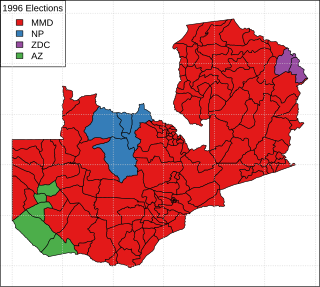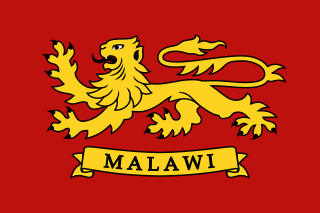
General elections were held in Malawi on 20 May 2004 to elect a President and the National Assembly. The election had originally been scheduled for 18 May but was postponed for two days in response to opposition complaints of irregularities in the voter roll. By 22 May no results had been announced, leading to protests from the opposition and threats of disorder. On 25 May the Malawi Electoral Commission finally announced the results of the election. Bingu wa Mutharika, the candidate of the ruling United Democratic Front, was declared the winner of the presidential poll, whilst the Malawi Congress Party had won most seats in the National Assembly vote. Voter turnout was around 62%.

Elections in Benin take place within the framework of a multi-party democracy and a presidential system. Both the President and the National Assembly are directly elected by voters, with elections organised by the Autonomous National Electoral Commission (CENA).

Elections in Guinea-Bissau take place within the framework of a multi-party democracy and a semi-presidential system. Both the President and the National People's Assembly are directly elected by voters.

The National Unity Party is a political party in the Central African Republic.

General elections were held in Zambia on 28 September 2006 to elect a President, members of the National Assembly and local government councillors. The result was a victory for the ruling Movement for Multi-Party Democracy, which won 75 of the 150 National Assembly seats and whose candidate, Levy Mwanawasa, won the presidential vote. Voter turnout was just over 70%.
General elections were held in Tanzania on 29 October 2000, with sixteen constituencies in Zanzibar voting again on 5 November due to problems with distributing election material. The second general elections since the restoration of multi-party democracy in 1992, they were won by the ruling Chama Cha Mapinduzi party, which claimed 202 of the 231 constituency seats in the National Assembly, and whose candidate, Benjamin Mkapa, winning the presidential election.

General elections were held in Malawi on 17 May 1994. Following the restoration of democracy the previous year, they were the first multi-party elections in the country since prior to independence in 1964. The elections for President and the National Assembly were both won by the United Democratic Front (UDF), ending the 30-year rule of the Malawi Congress Party (MCP). Former President-for-life Hastings Banda, in power since independence, was defeated in the one-round presidential election by the UDF's Bakili Muluzi.

General elections were held in Zambia on 19 December 1968 to elect the National Assembly and President. The first post-independence polls saw incumbent Kenneth Kaunda retain his post as president, whilst his United National Independence Party, the only party to field candidates in all 105 constituencies, won 81 of the 105 seats in the National Assembly. Voter turnout was 82.5% in the parliamentary election, but 87.1% in the presidential election.

General elections were held in Zambia on 5 December 1973. They were the first elections held since the country was formally declared a one-party state in August, with the United National Independence Party (UNIP) as the only legally permitted party. UNIP leader Kenneth Kaunda was automatically elected to a third five-year term as President, and was confirmed in office via a referendum in which 88.8% of voters approved his candidacy. UNIP also won all 125 seats in the National Assembly. Voter turnout was 39% of the 1,746,107 registered voters for the presidential election, and 33% for the National Assembly election.

General elections were held in Zambia on 12 December 1978. At the time, the country was a one-party state with the United National Independence Party (UNIP) as the sole legal party. UNIP leader Kenneth Kaunda was automatically elected to a fourth five-year term as President, with 80.7% of voters voting to confirm him in office. UNIP also won all 125 seats in the National Assembly. Voter turnout was around 65% in the parliamentary election, but 66.7% in the presidential election.

General elections were held in Zambia on 27 October 1983. At the time, the country was a one-party state, with the United National Independence Party (UNIP) as the only legally permitted party. Its leader, Kenneth Kaunda was automatically re-elected for a fifth term as President, and was confirmed in office with over 95% of the vote. UNIP also won all 125 seats in the National Assembly. Voter turnout was around 63% in the parliamentary election, but 65.5% in the presidential election.

General elections were held in Zambia on 26 October 1988. At the time, the country was a one-party state with the United National Independence Party (UNIP) as the sole legal party. UNIP leader Kenneth Kaunda was automatically re-elected for a sixth five-year term as President with 95.5% of the vote, whilst UNIP also won all 125 seats in the National Assembly. Voter turnout was around 60% in the parliamentary election, but 58.8% in the presidential election.

General elections were held in Zambia on 18 November 1996 to elect a President and National Assembly. They were boycotted by the main opposition party, the United National Independence Party, together with five other allied parties, following changes to the constitution which they failed to have reversed following a court challenge. The changes imposed a two-term limit on the presidency, required presidential candidates to be born to two Zambian citizens by birth or descent, and required National Assembly candidates to give up their chieftaincy. UNIP believed these changes were specifically aimed at their longtime leader, Kenneth Kaunda, whose parents were Malawian and had previously served as the country's first president from 1964 to 1991. The changes would have also excluded UNIP's vice president, a chief. Subsequently, the ruling Movement for Multi-Party Democracy won a comfortable victory in both elections, taking 131 of the 150 elected seats in the National Assembly, and its candidate, Frederick Chiluba, winning 73% of the vote in the presidential election.

General elections were held in Malawi on 26 and 27 June 1992. the Malawi Congress Party was the sole legal party at the time, the country having become a one-party state in 1966. Voter turnout was reported to be 80% by the government, but was actually around 40%. 62 incumbents lost their seats.

Presidential elections were held in the Democratic Republic of the Congo on 1 November 1970. The only candidate was Joseph Mobutu, who had taken power in a military coup five years earlier. The elections took the format of a "yes" or "no" vote for Mobutu's candidacy, with the results showing he won more "yes" votes than the number of registered voters, even though voting was not compulsory.

Presidential elections were held in Madagascar on 30 January 1972. Incumbent President Philibert Tsiranana of the Social Democratic Party was the only candidate, and won the approval of 99.7% of voters. However, public unrest led to him handing over power to General Gabriel Ramanantsoa. Ramanantsoa put forward proposals for a five-year transition period during which the National Assembly would be suspended. The plans were approved in a referendum later in the year.

Parliamentary elections were held in Madagascar on 28 August 1983, having originally been scheduled for 1982, but delayed by the presidential election and the "economic difficulties facing the country". Only parties affiliated with the AREMA-dominated National Front for the Defense of the Revolution were allowed to compete in the election. AREMA was the only party to field candidates in all 137 constituencies, and won 117 of them with over 65% of the vote.

General elections were held in the Seychelles between 23 and 26 June 1979 to elect a President and People's Assembly. Following a coup in 1977, the Seychelles People's Progressive Front was the sole legal party at the time. The only candidate in the presidential election was SPUP leader France-Albert René.

The Central African Republican Party is a political party in the Central African Republic.

The Congress for National Unity (CONU) is a political party in Malawi led by Daniel Kamfosi Nkhumbwe.












